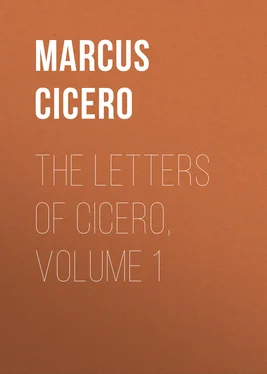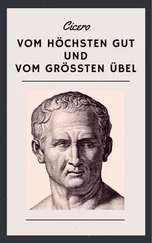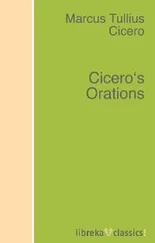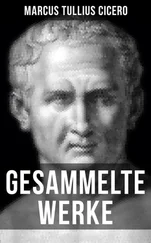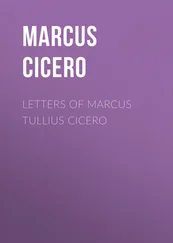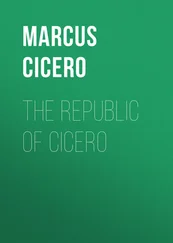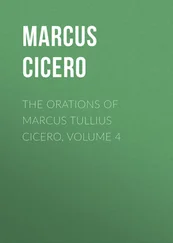Marcus Cicero - The Letters of Cicero, Volume 1
Здесь есть возможность читать онлайн «Marcus Cicero - The Letters of Cicero, Volume 1» — ознакомительный отрывок электронной книги совершенно бесплатно, а после прочтения отрывка купить полную версию. В некоторых случаях можно слушать аудио, скачать через торрент в формате fb2 и присутствует краткое содержание. Жанр: foreign_antique, Философия, foreign_edu, на английском языке. Описание произведения, (предисловие) а так же отзывы посетителей доступны на портале библиотеки ЛибКат.
- Название:The Letters of Cicero, Volume 1
- Автор:
- Жанр:
- Год:неизвестен
- ISBN:нет данных
- Рейтинг книги:4 / 5. Голосов: 1
-
Избранное:Добавить в избранное
- Отзывы:
-
Ваша оценка:
- 80
- 1
- 2
- 3
- 4
- 5
The Letters of Cicero, Volume 1: краткое содержание, описание и аннотация
Предлагаем к чтению аннотацию, описание, краткое содержание или предисловие (зависит от того, что написал сам автор книги «The Letters of Cicero, Volume 1»). Если вы не нашли необходимую информацию о книге — напишите в комментариях, мы постараемся отыскать её.
The Letters of Cicero, Volume 1 — читать онлайн ознакомительный отрывок
Ниже представлен текст книги, разбитый по страницам. Система сохранения места последней прочитанной страницы, позволяет с удобством читать онлайн бесплатно книгу «The Letters of Cicero, Volume 1», без необходимости каждый раз заново искать на чём Вы остановились. Поставьте закладку, и сможете в любой момент перейти на страницу, на которой закончили чтение.
Интервал:
Закладка:
and
τίς πατέρ' αἰνήσει εἰ μὴ εὐδαίμονες υἱοί.
138
Contained in Letter XXII, pp. 46-47.
139
Reading tibi for mihi , as Prof. Tyrrell suggests.
140
Σπάρτην ἔλαχες κείνην κοσμεῖ. "Sparta is your lot, do it credit," a line of Euripides which had become proverbial.
141
οἱ μὲν παρ' οὐδέν εἰσι, τοῖς δ' οὐδεν μέλει. Rhinton, a dramatist, circa b.c. 320-280 (of Tarentum or Syracuse).
142
See pp. 52, 56, 65.
143
See p. 57.
144
The lex Cincia (b.c. 204) forbade the taking of presents for acting as advocate in law courts.
145
Nep. Att. c. 18.
146
Atticus seems to have seen a copy belonging to some one else at Corfu. Cicero explains that he had kept back Atticus's copy for revision.
147
Cicero evidently intends Atticus to act as a publisher. His librarii will make copies. See p. 32, note 1.
148
The passage in brackets is believed by some, not on very good grounds, to be spurious. Otho is L. Roscius Otho, the author of the law as to the seats in the theatre of the equites. The "proscribed" are those proscribed by Sulla, their sons being forbidden to hold office, a disability which Cicero maintained for fear of civil disturbances. See in Pis. §§ 4-5.
149
Pulchellus, i.e. , P. Clodius Pulcher, the diminutive of contempt.
150
Where he had been as quæstor. Hera is said to be another name for Hybla. Some read heri , "only yesterday."
151
Clodius is shewing off his modesty. It was usual for persons returning from a province to send messengers in front, and to travel deliberately, that their friends might pay them the compliment of going out to meet them. Entering the city after nightfall was another method of avoiding a public reception. See Suet. Aug. 53.
152
See p. 37, note 3.
153
Clodia, wife of the consul Metellus. See p. 22, note.
154
We don't know who this is; probably a cavaliere servente of Clodia's.
155
I.e. , in the business of her brother Clodius's attempt to get the tribuneship.
156
Though Cæsar has been mentioned before in regard to his candidature for the consulship, and in connexion with the Clodius case, this is the first reference to him as a statesman. He is on the eve of his return from Spain, and already is giving indication of his coalition with Pompey. His military success in Spain first clearly demonstrated his importance.
157
During the meeting of the senate at the time of the Catilinarian conspiracy (2 Phil. § 16).
158
The consul Cæcilius Metellus was imprisoned by the tribune Flavius for resisting his land law (Dio, xxxvii. 50).
159
M. Favonius, an extreme Optimate. Ille Catonis æmulus (Suet. Aug. 13). He had a bitter tongue, but a faithful heart (Plut. Pomp. 60, 73; Vell. ii 73). He did not get the prætorship (which he was now seeking) till b.c. 49. He was executed after Philippi (Dio. 47, 49).
160
P. Scipio Nasica Metellus Pius, the future father-in-law of Pompey, who got the prætorship, was indicted for ambitus by Favonius.
161
Ἀπολλόνιος Μόλων of Alabanda taught rhetoric at Rhodes. Cicero had himself attended his lectures. He puns on the name Molon and molæ , "mill at which slaves worked."
162
See pp. 57, 60.
163
Reading discessionibus , "divisions in the senate," with Manutius and Tyrrell, not dissentionibus ; and deinde ne , but not st for si .
164
His study, which he playfully calls by this name, in imitation of that of Atticus. See p. 30.
165
See Letter XV XV (f v, 6) TO P. SESTIUS 65 (IN MACEDONIA) Rome, December b.c. 62, æt. 44 Decius the copyist has been to see me, and begged me to try and secure that no successor should be appointed to you this turn. Though I regarded him as a man of good character and attached to you, yet, remembering the tenor of your previous letter to me, I could not feel certain that the wishes of a cautious man of the world like yourself had undergone so complete a change. But after your wife Cornelia had called on Terentia, and I had had a conversation with Q. Cornelius, I took care to be present at every meeting of the senate, and found that the greatest trouble was to make Fufius the tribune, and the others to whom you had written, believe me rather than your own letters. The whole business has, after all, been postponed till January, but there is no difficulty about it. Roused by your congratulations—for in a letter sometime ago you wished me good luck on the completion of my purchase of a house from Crassus—I have bought that very house for 3,500 sestertia (about £28,000), a good while subsequent to your congratulation. Accordingly, you may now look upon me as being so deeply in debt as to be eager to join a conspiracy if anyone would admit me! But, partly from personal dislike they shut their doors in my face and openly denounce me as the punisher of conspiracy, partly are incredulous and afraid that I am setting a trap for them! Nor do they suppose that a man can be short of money who has relieved the money-lenders from a state of siege. In point of fact, money is plentiful at six per cent., and the success of my measures has caused me to be regarded as a good security. Your own house, and all the details of its construction, I have examined and strongly approve. As for Antonius, 66 though everyone notices his want of attention to my interests, I have nevertheless defended him in the senate with the utmost earnestness and persistence, and have made a strong impression on the senate by my language as well as by my personal prestige. Pray write to me more frequently.
, p. 25.
166
His translation of the Prognostics of Aratus.
167
Gaius Octavius, father of Augustus, governor of Macedonia.
168
The roll being unwound as he read and piled on the ground. Dicæarchus of Messene, a contemporary of Aristotle, wrote on "Constitutions" among other things. Procilius seems also to have written on polities.
169
Herodes, a teacher at Athens, afterwards tutor to young Cicero. He seems to have written on Cicero's consulship.
170
These remarks refer to something in Atticus's letter.
171
Gaius Antonius, about to be prosecuted for maiestas on his return from Macedonia.
172
P. Nigidius Figulus, a tribune (which dates the letter after the 10th of December). The tribunes had no right of summons ( vocatio ), they must personally enforce their commands.
173
"The Conqueror," i.e. , Pompey. Aulus's son is L. Afranius.
Читать дальшеИнтервал:
Закладка:
Похожие книги на «The Letters of Cicero, Volume 1»
Представляем Вашему вниманию похожие книги на «The Letters of Cicero, Volume 1» списком для выбора. Мы отобрали схожую по названию и смыслу литературу в надежде предоставить читателям больше вариантов отыскать новые, интересные, ещё непрочитанные произведения.
Обсуждение, отзывы о книге «The Letters of Cicero, Volume 1» и просто собственные мнения читателей. Оставьте ваши комментарии, напишите, что Вы думаете о произведении, его смысле или главных героях. Укажите что конкретно понравилось, а что нет, и почему Вы так считаете.
